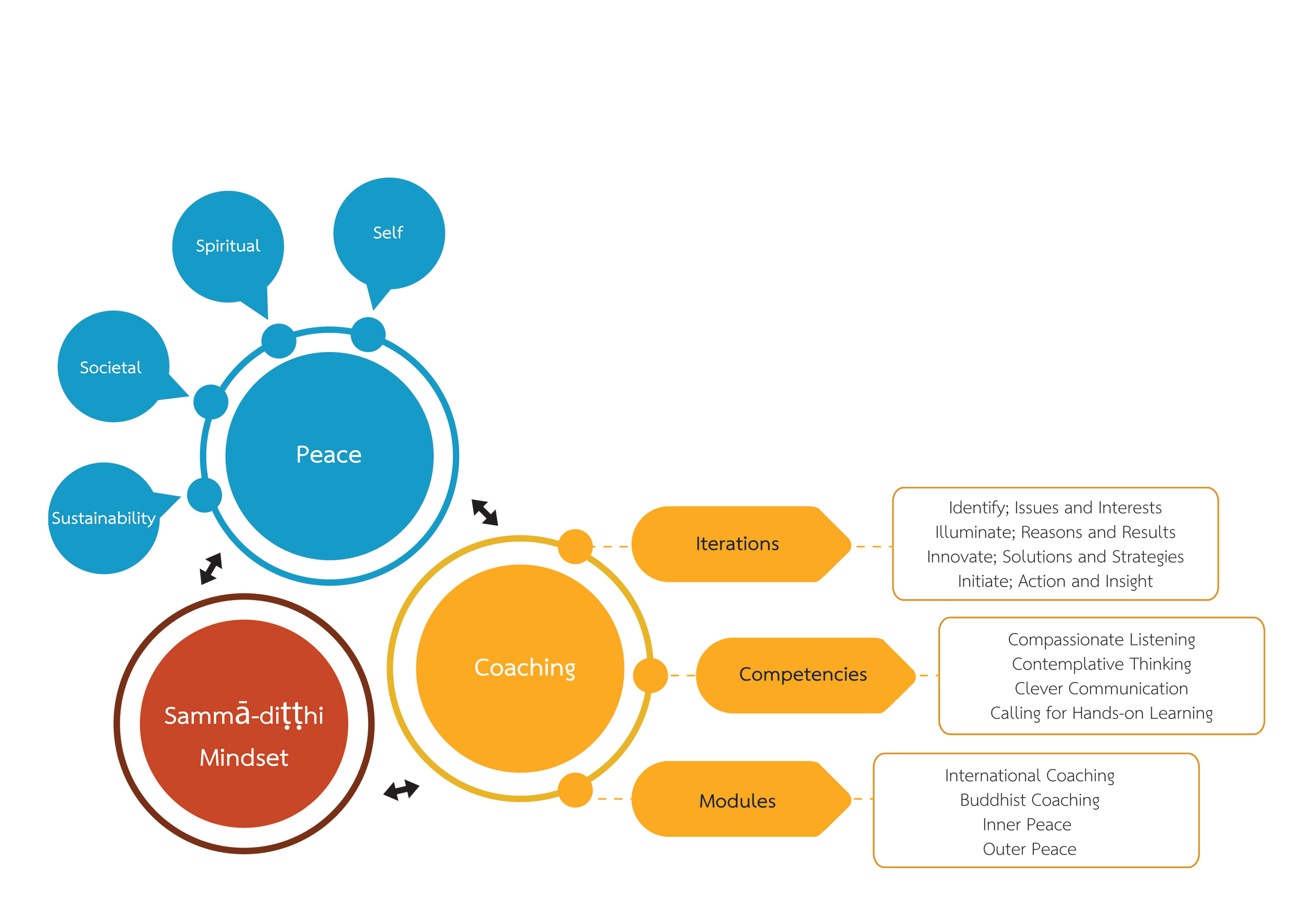A PEACE-BUILDING COACHING MODEL FOR PROPAGATING BUDDHIST MONKS IN THAI SOCIETY
Keywords:
Coaching for Peace Model, Integration Buddhist Principles, Buddhist Monks’s Teaching Morality, Thai SocietyAbstract
Background and Objective: This article explored the synergies between coaching methodologies and Buddhist principles, with a primary focus on their collaborative potential for promoting peace within Thai society. Recognizing the imperative to adapt traditional Buddhist propagation methods to align with changing societal dynamics, the article introduced coaching as a versatile and adaptable approach applicable in diverse contexts. The central goal was to formulate a unique coaching model, emphasizing the intricate interplay between Buddhist principles and fundamental coaching concepts. The model, designed as a dynamic response to the evolving societal landscape, sought to address contemporary challenges comprehensively. By weaving together the profound wisdom of Buddhist teachings with the flexibility of coaching methodologies, the proposed model aimed to contribute to a holistic peace-building paradigm. The model was intended to be a tool for coaches, educators, and other professionals to empower individuals and foster a more harmonious society.
Methodology: This study employed action research through the Ariyasacca model and interpretive phenomenological methods, aiming to bridge theory and practice by capturing monks' lived experiences in propagation efforts. Core data collection methods included document analysis, in-depth interviews with 12 participants, and experimental trials with 15 individuals. The research process integrated content analysis, descriptive analysis, semantic analysis, and synthesis for a comprehensive and rigorous approach.
Main Results: The development of a comprehensive coaching for peace model integrated international coaching methodologies with fundamental Buddhist principles to foster effective communication and dialogue. This innovative model incorporated key elements such as Samma-ditthi, peace, and coaching, strategically implemented through multidimensional learning units that encompassed coaching, Buddhist coaching, inner peace, and outer peace. The model was designed to achieve the overarching goal of peace across four dimensions: Self-awareness, Spiritual well-being, Societal harmony, and Sustainability. The model was based on the premise that peace can be cultivated by understanding and developing individual and societal well-being. It emphasized the importance of cultivating inner peace in order to create a sense of external harmony. The model also focused on creating sustainable solutions that benefit all stakeholders. By emphasizing these critical dimensions, the model strove to create a holistic approach that not only addresses individual well-being but extended to societal and environmental harmony. The integration of coaching principles with Buddhist teachings aimed to provide a transformative framework that went beyond personal development, contributing to a more comprehensive and enduring peace within individuals and communities. This approach acknowledged the interconnectedness of personal, spiritual, societal, and environmental well-being, underscoring the model's potential impact on fostering a more harmonious and sustainable society.
Involvement to Buddhadhamma: This model incorporated Samma-ditthi as a central component, along with Ariyasacca as iterations, the Heart of Pandit as competencies, and Citta Bhavana for inner peace, establishing connections with outer peace and promoting holistic linkage.
Conclusions: The developed model provided innovative and practical insights and applications that benefited the Sangha, communities, and the nation. It advocated for a transition to a two-way communication style for Buddhist monks engaged in propagation, with a focus on citizens' genuine happiness and alleviating suffering. The study emphasized understanding and addressing both monks and citizens' direct experiences, nurturing their minds and wisdom. The research laid the foundation for tailored short-term training courses, promoting the harmonious integration of coaching and Buddhist principles for peace propagation.
References
Berejnoi, E., Messer, D. & Cloutier, S. (2020). Cultivating Spiritual Well-Being for Sustainability: A Pilot Study. Sustainability, 12(24), 10342. https://doi.org/10.3390/su122410342.
Daensilp, P., Rungreangkolkij, S., Panitrat, R., Muangthai, K. & Pokeao, S. (2020). The Transformative Experiences after Participating on the Buddhist Counseling and Psychotherapy Program and Follow up of Kilannadham' Psychological Support Work on Death & Dying Patients. Journal of Education Khon Kaen University, 43(1), 15-26.
Kanjanataweewat, C. (2022). A Model of Developing an Ideal Leader Coach in Peace by Buddhist Peaceful Means. [Doctoral dissertation, Mahachulalongkornrajvidyalaya University]. Thesis Central Library Mahachulalongkornrajavidyalaya University. https://e-thesis.mcu.ac.th/thesis/4355.
Mahachulalongkornrajavidyalaya University. (1996). Thai Tripitaka. Bangkok, Thailand: MCU Press.
Narkurairatana, N. & Chaisukkosol, C. (2021). Deep Facilitation Methodology for Restoration in Deep Devided Society, trans. Prachason, S. & Chaisukkosol, C. Nakhon Pathom, Thailand: Institute of Human Rights and Peace Studies.
Phra Pramote Vadakovido Pantapat. (2018). A Model of Developing an Ideal Expert in Peace by Buddhist Peaceful Means. [Unpublished doctoral dissertation]. Mahachulalongkornrajvidyalaya University. Phra Nakhon Si Ayutthaya, Thailand.
Phramaha Apichai Mahapunyo. (2023). The Application of the Abhidhamma to Promote Well-Being in Daily Life. Journal of Buddhist Anthropology, 8(4), 305-314.
Phramaha Sutep Suddhinano Thanikkul. (2018). A Development Program of Buddhist Psyhology Counseling Competency of Volunteer Monk in Healing Mind of Patients. [Doctoral dissertation, Mahachulalongkornrajvidyalaya University]. E-Thesis Central Library Mahachulalongkornrajvidya-laya University. https://e-thesis.mcu.ac.th/thesis/643
Phra Thosaphon Nipko. (2023). An Analysis of Buddhist Monks's Adaptation to Propagation of the Buddha's Teachings During the COVID-19 Pandemic. Journal of Buddhist Anthropology, 8(2), 104-116.
Sanjariyapipu, T. (2020). Improve Customer Experience by Introducing Coach Assessment (CKA) Preparation Class: Case Study Thailand Coaching Institute. [Master's thesis, Chulalongkorn University]. Chula Digital Collection. https://digital.car.chula.ac.th/chulaetd/251.
Somdet Phra Buddhaghosacariya (P.A. Payutto). (2019). A Brief Introduction to the Buddha-Dhamma, trans. Bhikkhu Nirodho & Seeger, M. Bangkok, Thailand: O.S. Printing House.
Techapreechawong, B., Supasorn, P. & Somsri, T. (2021). Buddhist Teaching Integration to ICF Coach's Core Competencies. Mahachula Academic Journal, 8(3), 87-103.
Ven. Raniswala Sunanda. (2019). A Comparative Study on Coaching In Buddhist And Western Psychology To Create A Sustainable Society. In Most Ven. Thich Nhat Tu & Most Ven. Thich Duc Thien (Eds.), Buddhist Approach to Harmonious Family, Healthcare, and Sustainable Societies (pp. 685-705). Badinh, Vietnam: Hong Duc Publishing House.

Downloads
Published
How to Cite
Issue
Section
License
Copyright (c) 2024 Journal of Buddhist Anthropology

This work is licensed under a Creative Commons Attribution-NonCommercial-NoDerivatives 4.0 International License.








